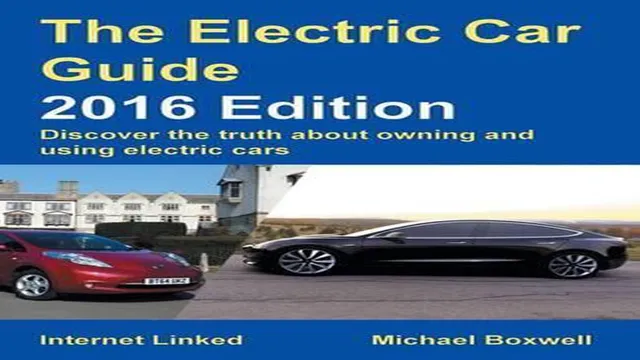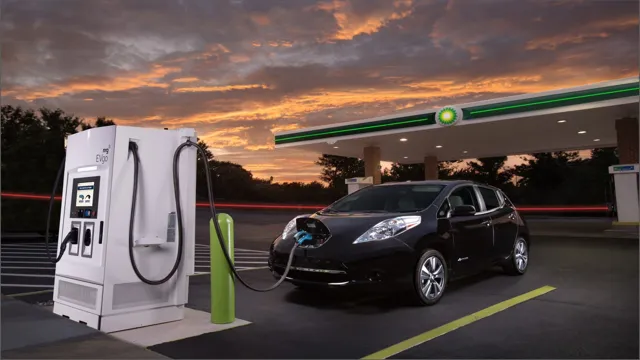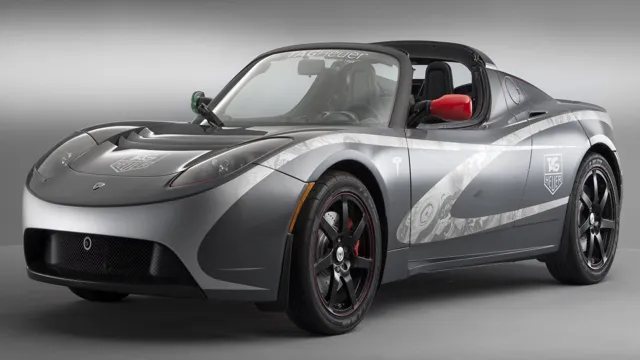The Ultimate Guide to Electric Cars: From Charging Tips to Model Comparisons!
Electric cars are gaining in popularity, but there are still many questions about them. How do they work? What are their benefits? Can they really replace traditional gas-powered cars? This guide aims to answer all those questions and more. By the end, you’ll have a clear understanding of electric vehicles and be able to decide if they’re right for you.
One of the most significant benefits of electric cars is their environmentally friendly nature. They produce zero emissions while driving, making them an excellent option for those looking to reduce their carbon footprint. Additionally, electric cars often have lower operating costs and require less maintenance than gas-powered cars.
They can be charged at home or public charging stations, and some come with the ability to charge on the go with regenerative braking technology. Plus, electric engines have instant torque, providing quick acceleration and a smooth ride. However, there are some downsides to electric cars to consider.
Their range can be limited, especially when compared to traditional gas-powered cars. Not all areas have easy access to charging stations, which can make long trips challenging. And while the lower maintenance costs are a plus, the initial purchase price of electric cars can be more expensive than their gas-powered counterparts.
Overall, electric cars have many benefits and are becoming an increasingly popular choice for drivers. By learning more about how they work and their pros and cons, you’ll have a better understanding of whether an electric car is the right vehicle for you.
Benefits of Electric Cars
For those who are considering making the switch to an electric car, there are many benefits that come with this decision. Firstly, electric cars offer a much lower cost of ownership compared to traditional gasoline cars. Because they run on electricity, they are much cheaper to fuel and maintain in the long run.
Additionally, electric cars are much better for the environment, emitting little to no harmful pollutants. They also provide a quieter and smoother ride due to their lack of engine noise and vibrations, making for a more comfortable driving experience. Additionally, many electric cars have longer ranges than they used to, and there are an increasing number of charging stations being installed across the country.
This means drivers can travel longer distances with ease and can easily find a place to charge up if needed. Overall, switching to an electric car can be a very positive decision for both your wallet and the environment. For a comprehensive guide to electric cars, be sure to check out our “Which Guide to Electric Cars.
“
Environmentally friendly
Electric cars are becoming a popular alternative to traditional gas-powered vehicles. One of the biggest benefits of electric cars is their environmental friendliness. With no tailpipe emissions, electric cars produce zero greenhouse gas emissions, which helps to reduce the impact of climate change.
This also means that these cars are better for air quality and can significantly reduce air pollution in cities. Additionally, electric cars are more efficient than traditional cars since they convert energy from their batteries to power their engines, rather than burning fuel. This results in a reduced need for oil, which helps to slow depletion and keeps prices stable.
Ultimately, electric cars are better for the environment, easier to maintain and are a more sustainable mode of transportation that will not only save you money but also limit the negative impact on the environment. And with charging stations popping up all over the country, owning an electric car has never been easier.

Lower maintenance costs
One of the major benefits of electric cars is their significantly lower maintenance costs. Unlike traditional cars with internal combustion engines, electric cars have fewer moving parts that can wear out or need regular maintenance. For instance, electric cars do not require oil changes, air filter replacements, or spark plug inspections, all of which can be expensive and time-consuming.
Additionally, electric cars have regenerative braking systems that help reduce wear and tear on brake pads and rotors. This means that electric car owners can save money on routine maintenance and have more peace of mind knowing that their vehicles are less prone to breakdowns. With electric cars, the main focus of maintenance is on the battery system, which generally has a longer lifespan than traditional car batteries.
Therefore, going electric not only benefits the environment but also the driver’s wallet in the long run.
Reduced fuel costs
Electric cars are a game-changer in the automotive industry, and one of their most compelling advantages is reduced fuel costs. Unlike conventional cars, electric vehicles (EVs) don’t rely on gasoline or diesel, but rather on electricity from a power outlet or charging station. Since electricity is generally cheaper than fossil fuels, the operational costs of EVs are lower, making them an attractive option for budget-conscious motorists.
Moreover, electric cars are more energy-efficient, converting up to 60% of the energy stored in the battery into motive power, compared to just 20% for traditional vehicles. This means that EVs can go further on a single charge, thereby reducing the frequency and cost of refueling. As fuel prices continue to rise and environmental concerns grow, the economic and environmental benefits of electric cars become increasingly apparent.
With features like regenerative braking, smart chargers, and renewable energy sources, EVs offer a sustainable and cost-effective solution for transportation.
Different Types of Electric Cars
If you’re considering purchasing an electric car, it’s important to know that there are different types available, each with their own unique features. The first type is the Battery Electric Vehicle (BEV), which uses only battery power to run. BEVs are considered the most environmentally friendly of all electric cars, as they produce zero emissions.
Another type is the Plug-in Hybrid Electric Vehicle (PHEV), which uses a combination of battery power and gasoline. PHEVs are great for those who may want to travel longer distances without worrying about recharging their vehicle. Finally, there is the Hybrid Electric Vehicle (HEV), which uses a combination of battery power and gasoline, but doesn’t require charging, as the battery is charged by the car’s engine.
HEVs are a great choice for those who want to save money on fuel costs, but aren’t ready to fully commit to an all-electric vehicle. Whatever type of electric car you choose, you can feel good about the positive impact you’re making on the environment. So, start your journey towards electric car ownership by choosing the right type of electric car for you.
Battery Electric Vehicles (BEVs)
Battery electric vehicles (BEVs) are a type of electric car that relies solely on an electric battery for power, without any use of gasoline or diesel. Unlike hybrid electric vehicles, BEVs do not have an internal combustion engine and fully rely on electric motors to propel the vehicle. There are several types of BEVs available in the market, including plug-in and all-electric models.
Plug-in BEVs come with a battery that can be recharged by plugging into a charging station or a standard electrical socket. On the other hand, all-electric BEVs are equipped with a large battery pack that is capable of providing enough power for long-distance journeys without the need for frequent recharging. These vehicles emit no tailpipe emissions, providing a more eco-friendly option for transportation.
While they may have a higher upfront cost compared to traditional gasoline-powered cars, BEVs offer long-term cost savings due to lower maintenance and fuel costs. Overall, BEVs are a promising option for those looking for a more sustainable and efficient way to get around.
Plug-in Hybrid Electric Vehicles (PHEVs)
One type of electric vehicle that’s becoming increasingly popular is the plug-in hybrid electric vehicle (PHEV). PHEVs combine a gasoline engine with an electric motor and battery, allowing them to run on either electricity or gasoline. These vehicles can be plugged in to charge their battery, which gives them a certain range on electric power alone before the gasoline engine kicks in.
This means that PHEVs can operate like a fully electric vehicle for short commutes or errands, but still have the long range of a traditional gasoline-powered car. For those who may have range anxiety with fully electric vehicles, PHEVs provide a good compromise. Plus, they tend to get better fuel economy than traditional gasoline vehicles, making them more environmentally friendly and cost-effective in the long run.
Hybrid Electric Vehicles (HEVs)
Hybrid Electric Vehicles (HEVs) Electric cars are quickly becoming mainstream, and for good reason. Not only are they better for the environment, but they can also save you a lot of money in the long run. However, when it comes to electric cars, not all are created equal.
There are three main types of electric cars: Battery Electric Vehicles (BEVs), Plug-In Hybrid Electric Vehicles (PHEVs), and Hybrid Electric Vehicles (HEVs). Let’s focus on Hybrid Electric Vehicles (HEVs). These cars combine an electric motor with a gasoline-powered engine, resulting in better fuel economy than traditional vehicles while still providing the security of a gas engine.
HEVs typically do not have to be plugged in, as they have regenerative braking technology, which charges the battery as it slows down. They are a great option for those looking for an environmentally conscious vehicle without changing their driving habits too much. So, if you’re in the market for a new car, consider a Hybrid Electric Vehicle (HEV) as an option that could be a perfect fit for you!
How to Choose an Electric Car
Looking to buy an electric car? With so many options out there, it can be overwhelming to determine which guide to electric cars is the best fit for you. Firstly, consider your lifestyle and driving habits. How far do you typically drive in a day? Do you have access to charging stations at home and work? These factors can help determine the driving range and charging needs of your electric car.
Next, consider the size and type of car that best suits your needs. From smaller, more affordable options like the Nissan Leaf and Chevy Bolt to larger luxury models like the Tesla Model S and Audi e-tron, there is an electric car for every preference and budget. Finally, research the safety ratings and features of your top contenders to ensure your new electric car is truly a smart and sustainable choice.
By taking these factors into account, you can confidently choose the electric car that fits your lifestyle and budget best.
Consider your driving needs
When it comes to choosing an electric car, it’s important to consider your driving needs. Ask yourself questions such as: How far do you typically drive in a day? Do you need to make long trips frequently? Will you mainly be using your car for commuting or running errands? Knowing the answers to these questions can help you choose the right electric car for your lifestyle. For example, if you need to make long trips frequently, you may want to consider an electric car with a longer range.
On the other hand, if you mainly use your car for commuting, you may not need as much range and can opt for a smaller, more efficient electric car. It’s also important to consider charging options and availability in your area. By considering your driving needs, you can ensure that you choose an electric car that fits your lifestyle and meets your expectations.
Research the available models
When it comes to choosing an electric car, it’s important to research the available models. With more and more options on the market, it can be overwhelming to know where to start. Begin by considering your needs and preferences.
If you prioritize range, look for a model with a larger battery. If you value performance, find a car with excellent acceleration. Once you have an idea of what you’re looking for, take the time to research and compare models.
Look for reviews and ratings from experts and current owners, and consider factors like price, charging time, and features. Don’t be afraid to test drive multiple models to get a feel for their handling and comfort. By doing your research and carefully considering your options, you can find the electric car that meets your needs and fits your lifestyle.
Charging an Electric Car
If you’re looking for a comprehensive guide to electric cars, you might be wondering how charging works. The good news is that charging an electric car is relatively simple and straightforward. There are several types of charging stations, ranging from basic Level 1 chargers to more advanced Level 3 chargers that can provide a full charge in as little as 30 minutes.
You can charge your electric car at home using a standard outlet or a specialized charging station, and many public places like parking garages and shopping centers now offer charging stations as well. During long trips, you may need to plan out your stops to ensure you have access to charging stations along the way. It’s also important to consider factors like the size of your car’s battery and your driving habits, as these can affect how often you need to charge and how long it will take.
By familiarizing yourself with the charging process and taking the necessary precautions, you can enjoy all the benefits of driving an electric car without any of the hassle.
Types of chargers
When it comes to charging an electric car, there are a few different types of chargers to consider. The most common type is a level 2 charger, which uses a 240-volt power source to charge the vehicle at a faster rate than a standard wall outlet. These chargers typically take between 4 and 8 hours to fully charge an electric car, depending on the battery capacity and level of charge.
However, there are also level 1 chargers, which use a standard 120-volt outlet and take longer to charge the vehicle. Additionally, there are fast chargers, also known as DC fast chargers, which can charge an electric car from 0 to 80% in as little as 30 minutes. These chargers use a higher voltage and amperage to rapidly charge the battery.
The type of charger you choose will ultimately depend on your specific needs and the availability of charging stations in your area.
Charging time and range
Charging an electric car can be a bit different compared to topping up a conventional car. This is because electric cars require more time to charge due to their battery capacity. The charging time can vary depending on the type of charger used and the car’s battery size.
For example, a 50-kW fast charger can recharge a car battery up to 80% in just 30 minutes, while a slower 7-kW home charger can take up to 6-8 hours. Additionally, the range of an electric car is also an important factor to consider. The range is the distance the car can travel on a single charge, and it can also vary depending on the car’s battery capacity.
For instance, a high-end electric car can travel up to 400 miles on a single charge, while a budget-friendly option may provide a range of around 100 to 200 miles. Therefore, it is essential to consider the charging time and range of a car before purchasing it.
Costs and incentives
When it comes to electric cars, charging is a crucial aspect that requires attention. Though charging an electric car is relatively easy, one needs to consider the costs and incentives that come with it. Fortunately, there are numerous ways to charge an electric car, such as using a wall-mounted charger, public charging stations, and even solar panels.
The cost of charging an electric car varies depending on several factors, including the type of charger, the battery size, and the state of charge. To make charging more affordable, many stakeholders offer incentives, such as rebates, tax credits, and discounts on charging stations. However, besides the cost of charging, car owners need to consider the range of the electric vehicle, as charging may require frequent stops during long trips.
Overall, charging an electric car is relatively simple, and with the right incentives and cost considerations, it can be much more affordable than traditional fuel options.
Conclusion: Why Choose an Electric Car?
After careful consideration and research, it’s clear that electric cars are the way of the future. With increasing concerns about climate change and the environment, the benefits of electric cars are simply undeniable – from reduced emissions to lower operating and maintenance costs. But, like any technology, electric cars require understanding and careful consideration before you take the plunge.
That’s why we’ve created the ultimate guide to electric cars, providing you with all the information you need to make an informed decision. So, if you’re thinking about joining the electric revolution, look no further than this guide. Trust us, diving into the world of electric cars has never been easier or more rewarding!”
FAQs
What are some advantages of electric cars compared to gas-powered cars?
Electric cars are more environmentally friendly, have lower fuel costs, and require less maintenance.
What is the range of an average electric car?
The range of an average electric car is around 100-200 miles, although this can vary depending on the specific model.
How do I charge an electric car?
You can charge an electric car at home using a charging station, or at public charging stations located throughout cities.
Are there any government incentives or tax credits for buying an electric car?
Yes, many governments offer incentives or tax credits for purchasing an electric car, often as a way to encourage people to switch to more environmentally friendly vehicles.
How long does it take to charge an electric car?
The charging time for an electric car depends on the battery size and the charging station used, but can range from a few hours to overnight.




